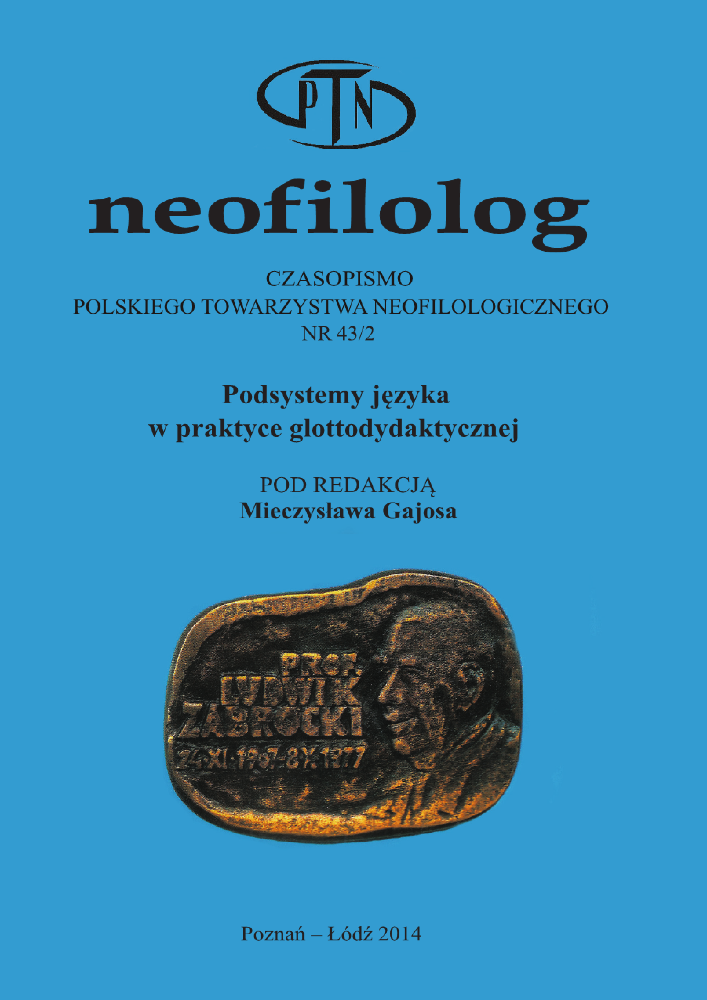Abstract
This report presents the results of a study into the relationship between musical ability and the development of a phonological system by foreign language learners. Our own experiences both as a foreign language teacher and as a musical group leader have raised a number of questions and lines of enquiry. These challenge previous researchers’ findings concerning the allegedly absolutely positive effect of music on language learning and as a result this study has been undertaken.After a brief theoretical presentation, we describe the research project in which learners abilities to distinguish and produce different phonemes as well as the prosody of the language studying are analyzed. Two groups of learners were compared in this study. One group attended a music school. The second group had no musical experience. The study showed that receptive skills were not significantly different between the two groups. The group of learners with musical training was more articulate but this was the only difference. The statistical approach used in analysis of data was the Wilcoxon test.
Literaturhinweise
Abry, D., Chalaron, M.L. 1994. Phonétique 350 exercices. Paris : Hachette.
Bencivelli, S. 2009. Pourquoi aime-t-on la musique? Oreille, émotion, évolution. Paris: Belin, Collection Pour La Science.
Chodkowski, A. (red.).1995. Encyklopedia muzyki. Warszawa: Wydawnictwo Naukowe PWN.
Fomina, A. 2000. «Song Melody Influence on Speech Intonation Memorization». (w) Woods, C., Luck, G.B., Brochard, R., O'Neill, S. A., i Sloboda, J. A. (red.). Proceedings of the Sixth International Conference on Music Perception and Cognition. Keele, Staffordshire, UK: Department of Psychology. http://www.escom.org/proceedings/ICMPC2000/Sun/Fomina.htm DW 13.04.2014.
Fonseca-Mora, M.-C., Toscano-Fuentes, C. i Wermke, K. 2010. «Melodies that help: The Relation between Language Aptitude and Musical Intelligence». Anglistik International Journal of English Study vol. 22(1): 101-118. http://files.eric.ed.gov/fulltext/ED518583.pdf DW 24.04.2014.
Gajos, M. 2010. Podsystemy języka w praktyce glottodydaktycznej. Fonetyka. Łódź: Wydawnictwo Uniwersytetu Łódzkiego.
Groeger, L. 2011. «Exploring the Musical Brain at the Society for Neuroscience Annual Meeting». Scientific American November 15. www.scientificamerican.com DW 9.02.2014.
Kania, J.T. 1982. Szkice logopedyczne. Warszawa: WSiP.
Klimczak-Waniek, E. 2009, «Badanie wymowy w języku obcym - od teorii do praktyki». Neofilolog 32: 19-33.
Ludke, K. 2008. Teaching foreign languages through songs (workbook), University of Edinburgh: Institute for music in human and social development. https://www.academia.edu/978951/Teaching_foreign_languages_through_songs_workbook_ DW 15.04.2014.
Medina, S.L. 1990. «The effect of music on second language vocabulary acquisition». National network for Early Language learning 6 (3): 1-26. http://www.oocities.org/ESLmusic/articles/article01.html DW 15.04.2014.
Murphy, T. 1990. «The song stuck in my head phenomenon: A melodic Din in the Lad». System vol. 18 (1): 53-64.
Sawa, B. 1984. «Percepcja słuchowa a normalny i zaburzony rozwój mowy». Psychologia wychowawcza 5: 575-586.
Siek-Piskozub, T. i Wach, A. 2006. Muzyka i słowa. Rola piosenki w procesie przyswajania języka obcego. Poznań: Wydawnictwo Naukowe UAM.
Wilczyńska, W i Michońska-Stadnik, A. 2010. Metodologia badań w glottodydaktyce. Wprowadzenie. Kraków: Avalon.
Zedda, P. 2006. «La langue chantée: un outil efficace pour l’apprentissage et la correction phonétique». Les Cahiers de l’Acedle 2 http://acedle.org/IMG/pdf/P-Zedda_cah2.pdf DW: 05.04.2014.
Lizenz
Copyright (c) 2019 Wioletta Piegzik

Dieses Werk steht unter der Lizenz Creative Commons Namensnennung - Keine Bearbeitungen 4.0 International.
Autoren:
Die Autoren der zur Veröffentlichung in der Zeitschrift Neofilolog angenommenen Texte sind verpflichtet, den Vertrag über die Erteilung einer kostenlosen Lizenz für die Werke mit der Verpflichtung zur Erteilung einer Sublizenz CC auszufüllen, zu unterzeichnen und an die Adresse der Redaktion zurückzusenden.
Gemäß Vertrag erteilen die Autoren auf die in der Zeitschrift Neofilolog veröffentlichten Texte der Adam-Mickiewicz-Universität in Poznań eine nicht exklusive und kostenlose Lizenz und erlauben die Verwendung der Sublizenz Creative Commons Attribution-NoDerivatives 4.0 International (CC BY-ND 4.0).
Die Autoren behalten das Recht zur weiteren freien Verfügung über das Werk.
Benutzer:
Interessierte Onlinebenutzer dürfen die seit 2017 veröffentlichten Werke unter folgenden Bedingungen nutzen:
- Anerkennung der Urheberschaft - die Verpflichtung, zusammen mit dem verbreiteten Werk Informationen über die Urheberschaft, den Titel, die Quelle (Links zum Originalwerk, DOI) und die Lizenz selbst bereitzustellen;
- ohne Schaffung abgeleiteter Werke - das Werk muss in seiner ursprünglichen Form erhalten bleiben, ohne Zustimmung des Autors dürfen keine Studien, beispielsweise Übersetzungen, verbreitet werden.
Die Urheberrechte aller veröffentlichen Texte sind vorbehalten.
Sonstige:
Die Adam-Mickiewicz-Universität in Poznań behält das Recht auf die Zeitschrift als Gesamtheit (Layout, Grafik, Titel, Umschlagsprojekt, Logo usw.).
